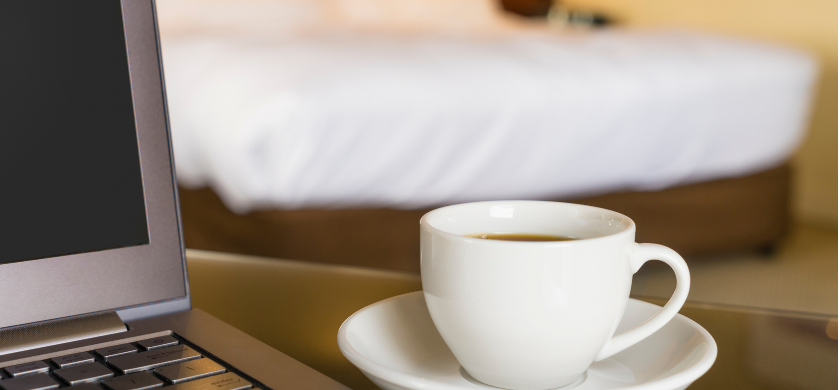Hotels always strive to enhance their guest experience. Providing value to travelers is vital to marketing and growing a hotel, whether by offering new amenities or improving In-Room Entertainment. Yet often, hotels fail to improve a vital part of guest experience: WiFi connectivity.
This blog will explore why strong WiFi networks are essential to the guest experience in hotels. Then, we’ll outline three key steps to improving hospitality WiFi, which can enhance the guest experience.
How WiFi in Hotels Impacts Guest Experience

Internet connectivity is integral to daily life. From phones and tablets to watches and glasses, nearly every hotel guest has devices they connect to the Internet. As such, a lack of reliable WiFi connection in hotels can impede guests from accessing essential assets of their everyday lives.
WiFi in hotels can also unlock intuitive new experiences for guests. Using their devices, travelers can access hotel wayfinding, online check-in, and a plethora of other virtual amenities through an Internet connection. Without a potent WiFi network, guests may miss out on dynamic, valuable experiences during their stay.
Finally, WiFi is fundamental to modern In-Room Entertainment. As in-room entertainment (IRE) shifts to rely on streaming services, smooth content streaming requires a reliable connection. Insufficient access to movies and television shows due to your hotel lacking the network to support them can disappoint travelers.
How to Improve Hotel WiFi With Three Steps

Upgrading WiFi in a hotel may seem complicated, but can be a smooth process with proper knowledge and the help of a professional. These three steps are essential initial strategies for long-term improvements in hotel network capabilities.
Because they each improve WiFi networks, all three of these steps also serve as excellent ideas to enhance the guest experience in hotels.
1. Performing a Network Audit
The first step to improving WiFi in a hotel is determining where a network needs to improve in the first place. To pinpoint necessary changes, we recommend performing a network audit.
Network audits analyze and assess several connectivity factors, offering a holistic overview of existing WiFi capabilities. Conducted by an experienced technician, audits will evaluate successes and deficiencies in signal performance, coverage, and capacity. Ultimately, these tests will determine what and how an internal network can improve.
Comprehensive audits will also include a physical audit of a network. Physical audits require a manual review of WiFi network installation, alongside network components such as firewalls, servers, switches, access points, and routers. Once fully assessed, a technician can take the necessary steps to improve a network.
2. Renewing or Changing the WiFi Installation
Networks often require physical changes to fully optimize coverage. In these cases, reviews or changes to the hotel WiFi installation may be necessary. Updating network installation can entail checking wiring, antennas, and wireless access point locations.
Many physical factors can impact the effectiveness of a WiFi network. Poor wireless access point locations are a frequent culprit of network slowdown; walls, installations, and even doors can impact WiFi signals. Moving the wireless access point to a more optimal location can improve network performance.
Other aspects of the installation that may need tweaking include network frequency, antenna configuration, and generally outdated equipment. Whatever the case, a skilled technician will be able to order new equipment, adjust locations, and ultimately solve the problem.
3. Monitoring the WiFi Network
Even after a hotel resolves initial issues with their network, the process of improving WiFi is not finished. WiFi maintenance requires continuous development and consistent monitoring to keep networks in top condition. Performance gaps ebb and flow based on a hotel’s current needs and scope.
Take, for instance, seasonal changes in hotel attendance. Beachside hotels will have a different busy season than a resort in the mountains; maintenance and network monitoring will vary throughout the year for either of these locations.
Security is also of the utmost concern when monitoring WiFi networks. Interference and network use from foreign entities can slow down and corrupt a network. Without increased cybersecurity, hoteliers may even expose guests to harmful data breaches.
Hiring a knowledgeable hospitality WiFi professional to monitor hotel networks is essential to continued quality. When performance drops, an experienced technician can help efficiently identify and solve problems
Upgrade Your Hotel Guest WiFi with Hospitality Network
With these three steps, hotels can jumpstart improving their WiFi networks. After performing an audit, changing installation, and implementing a plan to monitor the network, guests can expect far more reliable Internet, which will improve their overall experience. Although these steps are relatively simple, they can still be overwhelming without pre-existing knowledge of network technology.
Looking for a consultant to guide you through how to improve WiFi signals in your hotel? Hospitality Network offers customized network design, built for your guests and unique campus requirements. With 24/7 tech support, we help maintain some of the nation’s most powerful hospitality WiFi networks. Request a consultation and start the process of improving your WiFi today.

